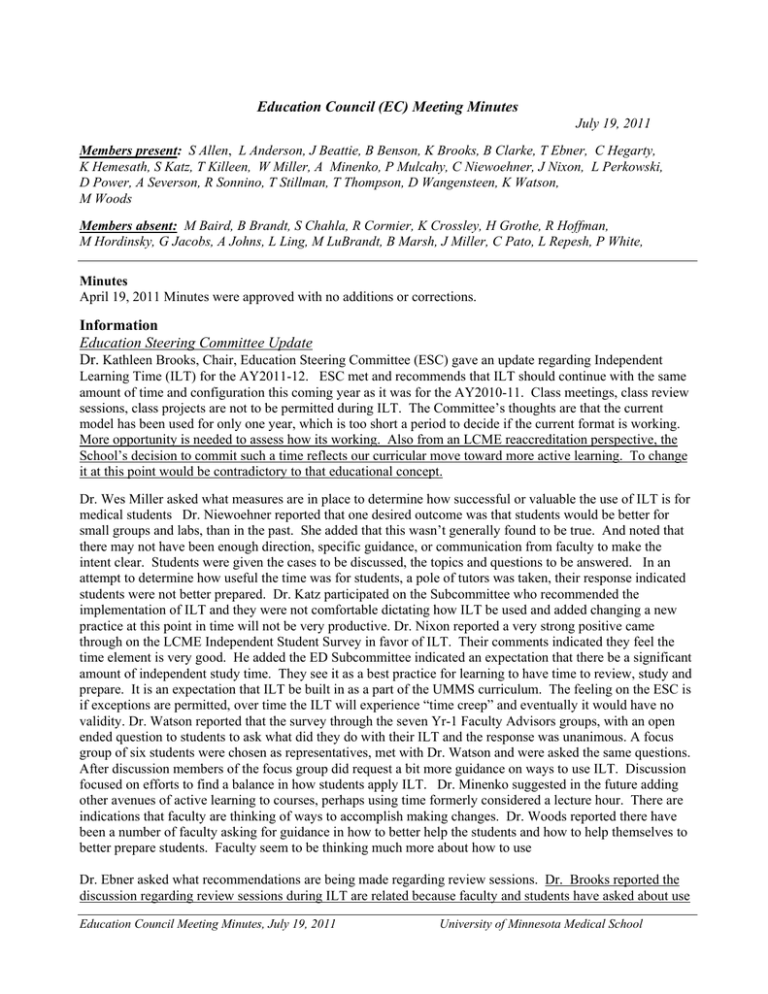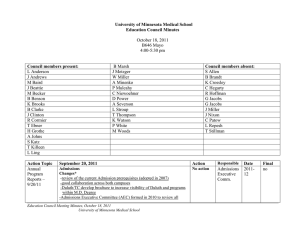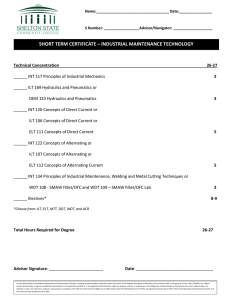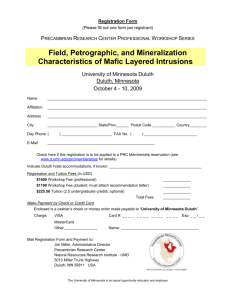Education Council (EC) Meeting Minutes
advertisement

Education Council (EC) Meeting Minutes July 19, 2011 Members present: S Allen, L Anderson, J Beattie, B Benson, K Brooks, B Clarke, T Ebner, C Hegarty, K Hemesath, S Katz, T Killeen, W Miller, A Minenko, P Mulcahy, C Niewoehner, J Nixon, L Perkowski, D Power, A Severson, R Sonnino, T Stillman, T Thompson, D Wangensteen, K Watson, M Woods Members absent: M Baird, B Brandt, S Chahla, R Cormier, K Crossley, H Grothe, R Hoffman, M Hordinsky, G Jacobs, A Johns, L Ling, M LuBrandt, B Marsh, J Miller, C Pato, L Repesh, P White, Minutes April 19, 2011 Minutes were approved with no additions or corrections. Information Education Steering Committee Update Dr. Kathleen Brooks, Chair, Education Steering Committee (ESC) gave an update regarding Independent Learning Time (ILT) for the AY2011-12. ESC met and recommends that ILT should continue with the same amount of time and configuration this coming year as it was for the AY2010-11. Class meetings, class review sessions, class projects are not to be permitted during ILT. The Committee’s thoughts are that the current model has been used for only one year, which is too short a period to decide if the current format is working. More opportunity is needed to assess how its working. Also from an LCME reaccreditation perspective, the School’s decision to commit such a time reflects our curricular move toward more active learning. To change it at this point would be contradictory to that educational concept. Dr. Wes Miller asked what measures are in place to determine how successful or valuable the use of ILT is for medical students Dr. Niewoehner reported that one desired outcome was that students would be better for small groups and labs, than in the past. She added that this wasn’t generally found to be true. And noted that there may not have been enough direction, specific guidance, or communication from faculty to make the intent clear. Students were given the cases to be discussed, the topics and questions to be answered. In an attempt to determine how useful the time was for students, a pole of tutors was taken, their response indicated students were not better prepared. Dr. Katz participated on the Subcommittee who recommended the implementation of ILT and they were not comfortable dictating how ILT be used and added changing a new practice at this point in time will not be very productive. Dr. Nixon reported a very strong positive came through on the LCME Independent Student Survey in favor of ILT. Their comments indicated they feel the time element is very good. He added the ED Subcommittee indicated an expectation that there be a significant amount of independent study time. They see it as a best practice for learning to have time to review, study and prepare. It is an expectation that ILT be built in as a part of the UMMS curriculum. The feeling on the ESC is if exceptions are permitted, over time the ILT will experience “time creep” and eventually it would have no validity. Dr. Watson reported that the survey through the seven Yr-1 Faculty Advisors groups, with an open ended question to students to ask what did they do with their ILT and the response was unanimous. A focus group of six students were chosen as representatives, met with Dr. Watson and were asked the same questions. After discussion members of the focus group did request a bit more guidance on ways to use ILT. Discussion focused on efforts to find a balance in how students apply ILT. Dr. Minenko suggested in the future adding other avenues of active learning to courses, perhaps using time formerly considered a lecture hour. There are indications that faculty are thinking of ways to accomplish making changes. Dr. Woods reported there have been a number of faculty asking for guidance in how to better help the students and how to help themselves to better prepare students. Faculty seem to be thinking much more about how to use Dr. Ebner asked what recommendations are being made regarding review sessions. Dr. Brooks reported the discussion regarding review sessions during ILT are related because faculty and students have asked about use Education Council Meeting Minutes, July 19, 2011 University of Minnesota Medical School of ILT for course reviews. In reference to this, there was much discussion by ESC about review sessions; what should they be, should they be within ILT, within courses and what is the definition of a review session? ESC came to the conclusion that a review session should be a study session aimed at fostering active and engaged learning and not a time for delivery of new material. Different formats were discussed and ESC’s recommendation is that review sessions not take place during ILT. Because of the variation in courses, whether a course has reviews and/or what format a course director may choose for their review sessions, ESC doesn’t dictate a particular format. ESC did decided that reviews will not take place during ILT, but will occur as part of the regularly scheduled course time or possibly have them take place over the noon hour. If they take place over the noon hour they would not be required and the limitation would be no more than 3 sessions per week. This is to prevent lunch times from being completely absorbed by additional sessions, causing course activities to run into additional hours with no breaks. ESC had an added discussion about how students may be caught in cross messaging, i.e. faculty telling students that not being able to use ILT time for review is due to Administration not allowing the practice. Dr. Johns noted Duluth uses the term “independent study time” but feels they could easily transition to using ILT for their curriculum. He also agrees that if a block of time is left vacant faculty will see it as an opportunity to schedule added time. In reference to use of review sessions across the board, quizzes can be given throughout the course and if gaps are indicated as the course progresses, reviews are appropriate, not necessarily because students prefer them. Dr. Niewoehner noted that review sessions for all of Yr-2 are recorded and the answers are provided after the session, students do not have to attend to get access to the review materials. ESC discussed the pros and cons of recording review sessions and whether this practice creates an environment of active learning. If it isn’t recorded students come if they want to be engaged and participate. LCME Mock Site Visit Dates Patti Mulcahy reported that all three consultants have confirmed for October 2nd through October 5th. One will spend a day in Duluth and the Schedule will be typical of what will take place in March. On October 3rd hours have been assigned for Basic Science course directors and an assigned time for the Clinical Education clerkship directors. Dr. Miller noted the consultants will meet with the Clinical Science Council on Tuesday, at their standing noon meeting, he asked if they will meet with the Basic Science Council? The Executive Summary will be available for faculty and those who are participating, as well as the Database. People will be asked to prepare for the Mock visit as they will prepare for the actual Site Visit. Dr. Power asked for the specific times to be make available as soon as possible for clinical scheduling purposes. Discussion LCME Subcommittee Recommendations Dr. Perkowski noted the report contains areas of concern and areas of strength. The document is not complete, but the Subcommittees are working through the data and the questions. Not all items shown here will go forward into the final summary document. The summary has not been drafted yet, but it will be 35 pages long, in which we are required to articulate the things that are working well and the things that are not; with recommendations for addressing concerns. The ED Subcommittee Report will be reviewed on Friday, July 22nd and it has the most to do with the functions of the Education Council. The ED’s will be presented at a future meeting. The Subcommittees submit their reports to the LCME Steering Committee the Steering Committee has asked for some modifications. Members of the Steering Committee will write the Self-Study Report. Dr. Miller asked how the School proceeds to correct areas of concern that they have control to fix? Dr. Perkowski responded that for the Mock visit all of the data contained in the Report and the data base can be changed until December, 2011 when the final report is due. The Mock Visit is to help identify problems and EC members, faculty and other will review the report, etc. to help identify where changes and recommendations for change are possible. Dr. Perkowski strongly urged everyone to review documents as they become available. She reiterated that a “good self study is one where you identify areas where you want to improve and then come up with a plan for it. She pointed out that its important the we spend our time working on things that aren’t working, not on things that are working. She is certain that there is still data missing, which is why it isn’t being shared at this time, once it is ready it will be made available. Dr. Friedman’s approach is total transparency and the goal is to make it available. If all concerns are not addressed before the Education Council Meeting Minutes, July 19, 2011 University of Minnesota Medical School Mock site visit there are still 2 months left to correct identified areas before the report is due. Some things can be changed up until the site visit in March, as long as they are well documented. Themes include the following: How will UMMS have a bi-campus educational effort? Important issues from the Independent Student Analysis regarding problems with scheduling Issues of study and relaxation space Other suggestions: Capacity for teaching, issues on both campuses and for RPAP Student and faculty dissatisfaction with course web sites Curriculum management tools Assessment tools, i.e. portfolios An AHC task force was formed to look at the value of Homer for all of the AHC Schools. An internal group was formed to review the curriculum management plug-in to work with Homer, called 145. This process lasted for 1 and ½ years. Ultimately the decision to purchase was close to final but was halted at the AHC level. Partially because 145 was not suitable for all AHC Schools, and partially because of central oversight issues within AHC. Partly because of a misunderstanding of the complexity of medical education and the assumption that something as simple as Moodle could meet all of the needs of medical education. Dr. Nixon added that the OIT’s position is that everything being used has to be at an enterprise software level. Their perception is that soft must be able to interface with everything for everybody. AHC has been trying to convey to OIT how unique the needs for the health professional schools are in regard to software and other tools. Eighteen months ago UMMS started to consider reporting needs for LCME purposes and looked at the George Washington University (GW) Database. Duluth began working on their own program and under Dr. Lindsey Henson’s direction they began working to program a way to link with the GW software. As a result the Duluth IT team has developed Athena and/or Black Bag, which is a repository for their data. Dr. Johns reported that programming of black bag and its linkage with their calendar system works very well. Duluth is at the stage now where they are entering course objectives and linking them to overall objectives and also have the capability to enter session objectives. All of the layers are searchable. Patti Mulcahy noted that the UMMSTC IT team has developed a holding tank as a repository for TC data that will be used for curriculum mapping. This repository would also work with the GW Software to provide a way to pull data from the mapping system and to report on it. When LCME comes and asks where we teach such and such a topic, it will be possible to search for it and write a report. During the summer staff on both campuses are looking for ways to tie the data from both resources so the GW reporting system can pull from both of them to utilize for LCME’s required reports. The Homer solution was a very good system, but they pulled back once they found they would be dealing with the entire Univeristy of Minnesota. Their preference was to deal with the Medical School as a partner to continue in developing ways to use the software. EC members ask if we are going to be able to deliver the curriculum mapping that LCME requires. Dr. Watson responded yes. Dr. Ebner asked if the problem was that it had to be put on AHC computers. Dr. Watson stated that it was the oversight, it was the inter-relationship between the different layers of technologies at the University. Dr. Johns brought up the concern regarding retiring at the Duluth campus. Dr. Miller asked what response Duluth will have for those questions. Dr. Johns reported that a strategic plan is in place. It will be important to explore whether an interim plan can make use of resources shared between Duluth and TC campuses. Its necessary to formalize the process that currently takes place to share teaching of courses. Dr. Perkowski reported that Dr. Friedman and Dr. Davis have discussed a Plan B. She noted faculty replacement is an issue we’ve been cited on in the past. For any accreditation process if a School has been cited once and it still isn’t fixed, they ask why. We will need a very specific plan in place for solving the issue., which holds vulnerability for us in the LCME reaccreditation process. Dr. Watson reported that the SFC & CEC planning Education Council Meeting Minutes, July 19, 2011 University of Minnesota Medical School group are going to bring the issues to the SFC and CEC members to work on developing ways for faculty from both campuses to work together on interim solutions. TC Neuroscience will be working with Duluth on teaching this year and will need to formalize their plan. Having access to each others’ curriculum through Athena helps faculty to see what takes place in each others’ program. Which will aid curriculum planning. Also money has been identified by Medical School Finance for technical improvements to student study space. Regarding student concerns with clerkship registration, Dr. Cullen Hegarty, Chair, Clinical Education Committee (CEC) reported that CEC members have discussed student scheduling issues and feel some concerns could be improved through information sessions about the process. His feeling is students don’t understand that they have fairly good control over their third and fourth year schedules, advising before registration is important in understanding the effect of their choices. Depending on the order they want their rotations, they may encounter barriers. He emphasized students can schedule time off when they want and can choose the order they want for their rotations. This is unique in comparison with schools that require specific clerkship order for year 3 with some variability in the fourth year but may have prescribed times off. Dr. Hegarty’s impression is student expectations for some variables are unrealistic, which become situations that lead to dissatisfaction. He suggested demonstrating for students how scheduling is done at different schools and asking for feedback from students on changes to our system through a different model. Dr. Thompson stated recent issues have also been related to an increase in the number of students and a decrease in the number of clerkship slots. He noted that there is a range of 60-80 fewer rotation slots available over the last two years. Several possibilities exist to help resolve this situation and include; requesting a few additional slots from several clerkship, and assessing the situation with student Step 1 preparation during Period 1 (35 open slots). As Dr. Miller pointed out, there were no Yr-3 students in Medicine for Period 8. Dr. Brooks added that the Faculty Advisors system is seen as a strength. Thus in future the 1:1 interaction with students and advisors will aid in how students view their clinical rotation schedule. An on-going concern with scheduling is Yr-4 students taking a required clerkships late in the 4th year. This situation also affects the Schools ability to establish Milestone assessments at “x” point, for all Yr-4 students. At this point the only absolute deadline for all Yr-4 students to have completed their required rotations is Period 8, which is too late to schedule a final Milestone. Is there capacity to for all students to achieve all required rotations by a specific scheduling period.? Dr. Nixon proposed some changes that would solve the existing scheduling issues, which Dr. Miller agreed should be discussed. Student feedback indicates that scheduling is also affected by studying for Step I and Step II. Dr. Miller added it is important to have a better understanding of the available clerkship rotations before asking for additional rotation slots. LCME – Dr. Aaron Friedman, Dean, Aaron Friedman, MD, spoke of the progress being made in preparation for completing the LCME Self Study. He indicated there is just one subcommittee report left to be reviewed. The Steering Committee’s writing will detail issues that have to be addressed before the Site Visit. A number of the issues are existing and have previously been of concern. There is a wide range of issues including those related to facilities such as small group rooms and study space. Issues that would prevent full integration of curricula will be addressed directly. If accreditation isn’t achieved in 2012, the work that would be required to prepare for another visit in a year would be very difficult. The Education Council and those people in charge of faculty will have to realize that we have a relatively short period of time to address these concerns. Within approximately 6 weeks the information will be complete and the issues will be addressed. Work on integration within courses, integration across courses and integration between Duluth and the Twin Cities campuses. All of these items will be on the table and the areas identified in the Self Study have been brought to the attention of everyone in the past. We will not have time to achieve completion in the areas of concern, but enough work must be done so progress is apparent. Dr. Perkowski reminded the Council that there must be a recommendation presented for every concern. Dr. Friedman reminded everyone that the most critical concerns are those that were identified as existing during the last Accreditation process. There must have recommendations that show progress is being made. Will assignments be made to achieve the level of work needed? Dr. Friedman stated that it will be apparent where the work must be done. Education Council Meeting Minutes, July 19, 2011 University of Minnesota Medical School A large area of concern is the ability to educate the students across both campuses. There is a plan in place in Duluth and to achieve it will involve the Twin Cities and Duluth finding ways to have a common curriculum and the ability to teach across two campuses. It is about fulfilling the commitment to students who are enrolled on both campuses. UME Leadership Changes Dr. Friedman announced that Dr. Linda Perkowski will leave the Medical School at the end of August. Discussions are underway to determine oversight of the work being done in UME on both a short term basis and for the long term. Areas of great importance are administrative oversight of Duluth and the Twin Cities and comparability across campuses and courses. He thanked Dr. Perkowski for her contributions to our program. She has also agreed to continue to be involved in the preparation of the LCME Self Study report and for the Site Visit. Roles are being reviewed and redesigned to fit the needs across all aspects of Medical Education. Dr. Watson shared that the process to decide how to redesign the functions. Dr. Perkowski reported that Dr. Sophie Gladden will provide part time expertise to Medical Education. Dr. Friedman reiterated the broad scope of details and functions that are being considered during the redesign. Next Education Council Meeting – August 16, 2011 Education Council Meeting Minutes, July 19, 2011 University of Minnesota Medical School


